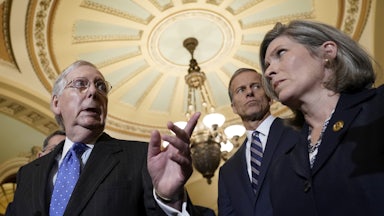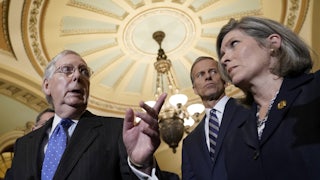It’s hard to write about American politics without writing about Congress’s weakness as an institution. What should be the engine of American democracy at the federal level is a sputtering mess, barely able to pass bills to keep the government open or avoid defaults on the national debt. Thanks to gerrymandered House seats and the mere threat of the Senate filibuster, it is almost impossible for major legislation from either party to become law. With lawmakers unable to actually implement the policies that they ran on, voters grow cynical about American democracy and basic legislative functions devolve into performative stunts.
A mild but telling symptom of Congress’s woes is how many proposed federal laws are given jokeish, cutesy, or otherwise unserious names. Take, for instance, a brouhaha this week over a $30 million federal program that provides harm-reduction grants to local governments and nonprofits that work on drug addiction. The program’s goal is to prevent overdoses and mitigate other harmful health consequences of drug addiction. One tool is safe-smoking kits, which can include rubber mouthpieces, lip balm, and other things to reduce the risk of injury. Some kits include actual glass pipes; others do not.
The Washington Free Beacon, a right-wing publication, reported on the program earlier this week with the inflammatory title “Biden Admin to Fund Crack Pipe Distribution to Advance ‘Racial Equity.’” The Free Beacon claimed that a Department of Health and Human Services spokesperson told them that the grants “will provide pipes for users to smoke crack cocaine, crystal methamphetamine, and ‘any illicit substance’” as part of a safe-smoking kit. The White House quickly denied that any federal money would go toward crack pipes, while HHS told The Washington Post that the Free Beacon reporter had drawn false conclusions from what an agency spokesperson had told him.
All of this reached its logical conclusion on Thursday when Florida Senator Marco Rubio and a few of his GOP colleagues leaped into action. They announced the introduction of a bill that would ban the government from directly or indirectly funding the distribution of crack pipes. Its short title: the Cutting Rampant Access to Crack Kits Act of 2022, also known as the CRACK Act. A day later, Rubio and West Virginia Senator Joe Manchin teamed up to dream up the Preventing Illicit Paraphernalia for Exchange Systems Act, or PIPES Act, to ban funding for clean syringes and needles. There were no committee hearings, no fact-finding efforts, and no opportunities for HHS or drug-policy experts to explain safe-smoking kits or how the program would actually work. There was only a knee-jerk acronym bill with an eye-catching title that would play well on Fox News.
Not every bill with an acronym is purely performative, of course. The Cares Act, also known as the Coronavirus Aid, Relief, and Economic Security Act, provided more than $2 trillion in economic relief at the start of the Covid-19 pandemic in a variety of direct and indirect forms, placing it among the most ambitious and impactful pieces of legislation ever passed by Congress. But that bill is an outlier in many ways, including this one. Many acronym bills reflect a deeper institutional malaise in Congress.
How persistent is this problem? Noah Veltman, a former journalist and data guru, compiled a database of every bill acronym between 1973 and 2013. “Most acronyms in bill titles directly relate to the subject of the bill, like the Arsenic Prevention and Protection from Lead Exposure in Juice (APPLE Juice) Act,” he wrote. “But some seem like complete non sequiturs. Perhaps the biggest puzzle is the Build America Bonds Extension for Rural and Urban Transportation and Highways Act (BABE RUTH) Act. There’s no evidence that the sponsor, Rep. Laura Richardson (D-CA), is even a Yankees fan.”
In most cases, Congress is far less imaginative than it appears. A perennial favorite is the SAFE Act, which was used to mean anything from “Secure Access to Firearms Enhancement” to “Security and Financial Empowerment.” Sometimes an acronym bill’s name gets wider acceptance, like the still-pending Dream Act that would provide a pathway to citizenship for undocumented immigrants who were brought to the U.S. as children. But that hasn’t stopped other Dream Acts from being introduced, joining other frequent fliers like the CARE Act, the FAIR Act, the HELP Act, and so on.
The leader of the Acronym Caucus during the time period scrutinized by Veltman was none other than New York Senator Chuck Schumer, the current Senate majority leader. He sponsored a grand total of 42 acronym bills through 2013. In 2012 alone, Schumer introduced the Restoring Integrity and Good-Heartedness in Traveler Screening Act, the Jobs Originated through Launching Travel Act, and the Benefits to Research and American Innovation through Nationality Statutes Act. Neither the RIGHTS Act, the JOLT Act, nor the BRAINS Act actually became law that year. (It’s possible that their provisions made it into later federal laws.)
Though Democrats appear to introduce more of them, acronym bills are a bipartisan scourge. Perhaps the most infamous example is the USA Patriot Act, a sweeping anti–civil liberties bill passed by Congress in the aftermath of the 9/11 attacks. It epitomized a habit on Capitol Hill of giving names to bills that masked their internal workings and made it awkward for opponents to vocally denounce at first. (Few lawmakers wanted to vote against something described as patriotic after 9/11.) With the USA Patriot Act and other national-security bills like the Protect America Act and the USA FREEDOM Act, there is also a whiff of Orwellianism to the names, as if you hated apple pie and baseball if you voted against them.
Most major federal laws used to be known by relatively mundane titles: the Communications Act of 1934, the Voting Rights Act of 1965, the Americans With Disabilities Act of 1990, and so on. Some laws received normal short titles but became better known as something else: The National Prohibition Act, which enforced the Eighteenth Amendment’s ban on alcohol, became publicly known as the Volstead Act, after its sponsor. And the medley of Reconstruction-era legislation passed in the late 1860s and early 1870s is usually referred to as the Enforcement Acts, the Reconstruction Acts, or, in one case, the Ku Klux Klan Act.
A few trends have grown particularly acute. One is the tendency to name pieces of legislation after current or former lawmakers. At first, this was done out of convenience. Perhaps the best example is the Sherman Antitrust Act of 1890, the flagship federal antitrust statute. Ohio Senator John Sherman wrote it but did not name it after himself. That appellation came later when people apparently found it easier to refer to it as “the Sherman Act” than to its long title, An Act to Protect Trade and Commerce Against Unlawful Restraints and Monopolies. Congress later formalized the name in a 1974 antitrust law.
Using lawmakers’ names for complex legislation still happens, as with “Dodd-Frank”—the sprawling financial-reform law passed after the 2008 crash, which was named for its principal authors. But a more common practice these days is for lawmakers to invoke past and present colleagues as de facto honors. The National Defense Authorization Act, the annual bill that funds and regulates the U.S. military, is now often named after former chairs of the House and Senate armed services committees like John McCain or Mac Thornberry. Since their successors on those committees also presumably want future bills named after them, there may be a perverse incentive of sorts to maintain that strange tradition.
Congress’s naming habits appear to be an outlier among American legislatures. In most state legislatures, bills are typically identified by number rather than by name. Last year’s Texas abortion-bounty law is usually referred to as Senate Bill 8, for example, though it was also named the Texas Heartbeat Act by its sponsors. New York is one of the few states that follows Congress’s lead, with similarly embarrassing outcomes: When state lawmakers drafted a bill that would require presidential candidates to disclose their tax returns, they unsubtly named it the Tax Returns Uniformly Made Public Act.
These name games are all but unthinkable in some other countries. The British Parliament invariably uses short titles like the European Union (Withdrawal) Act, the Fisheries Act, the Wild Animals in Circuses Act, or other similarly neutral names. A British parliamentary lawyer told me that short titles are typically worked out between the bill’s author and Parliament’s permanent staff and that even government ministers tend to prefer more formal-sounding names. While a high-profile bill might be publicly known by a more flashy name, such as the “Great Repeal Bill” during the Brexit process, it isn’t used in an official context.
Back in Washington, there are some who’ve tried to mandate a more sober approach to federal lawmaking. Former California Representative Mike Honda once introduced the Accountability and Congressional Responsibility on Naming Your Motions Act, or ACRONYM Act, that would have barred short titles for bills that were written solely to form acronyms. (He also reportedly cited the USA Patriot Act’s title as one reason for his vote against it in 2001.) Today, it’s hard to imagine more substantive restrictions on bill titles gaining traction. Lawmakers from both parties seem to cherish acronyms so much that they might reject any limits on bill titles as censorship.
Bill titles aren’t the most pressing issue for lawmakers, of course, or anywhere near the most important internal reform for them to consider. But they are a useful benchmark for how much Congress has declined over the past 30 years from a serious legislative body that could pass serious legislation to a performative arena for partisan feuds. With the real legislative process largely centralized in leadership offices, most rank-and-file lawmakers know that their proposals stand little chance of becoming law and that they might as well make a spectacle of them. As long as that’s true, acronym bills will continue to bedevil us.










